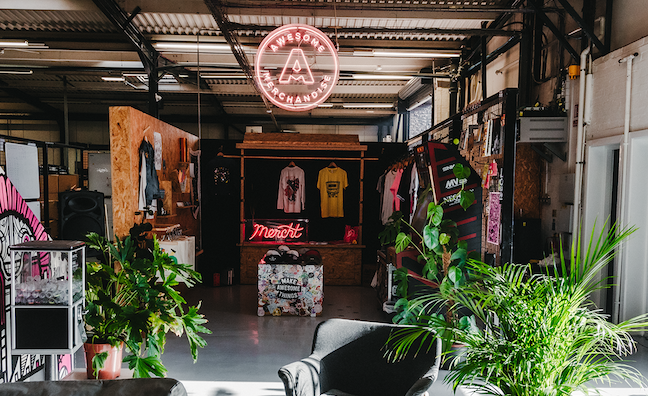With gigs and festivals pulled for the foreseeable future, music merchandise companies have increasingly embraced e-commerce during the lockdown.
As revealed in our special report on the sector, merch companies are focusing efforts online and working around the Covid-19 restrictions.
Here, James Lyall, MD of Leeds-based Awesome Merch, opens up about the challenges and new opportunities…
What has the Covid-19 impact been on the production, distribution and sale of merch?
“The production of merch has been a lot more difficult since the start of Covid-19 – the supply chain for consumables and garments has been stretched, and the overall impact on courier deliveries means access to stock can take a few days longer than expected, which means we are waiting for stock to arrive before we can start scheduling our print.
“Distribution of merchandise has been relatively steady from a sales and distribution perspective – we manage over 80 online stores for independent record labels, bands and artists, and we are seeing a steady rise in D2C sales. As fans can no longer buy merch at gigs, venues or in shops, more artists are promoting their online stores and launching new and exclusive pieces more regularly.”
How are you managing under the restrictions?
“We introduced social distancing in the workplace right off the bat when the government announced guidelines for businesses to stay open. This was quite disruptive to people’s working hours, shifts and travel so we had to adjust a few times to find the right balance. We are now working to one operator per machine (as opposed to two in most instances across screenprint, embroidery and digital print) so productivity has taken a hit. As much as this has been a big challenge for us, we are working on new initiatives and ways of working to help mitigate this.”
More artists are promoting their online stores and launching new and exclusive pieces more regularly
James Lyall
In terms of global sales, how has this pandemic affected different markets at different times?
“Initially, demand dropped off a cliff - I think most people just froze for a few days when lockdown started and had to find ways to keep their families safe and their businesses running. Slowly, after three to four weeks, we saw sales starting to recover, especially from the artist and venue side of the industry, as they started to work out ways to generate revenue from other streams versus the traditional live music, beer sales etc.
“We've been speaking to a lot of venue owners and artists to understand their needs, and trying to find the fastest ways we can help them generate revenue with merchandise and offering support where we can with distribution on top of fulfilment and ideas for fundraising. This has filtered down to the wider music community and we are seeing more people use merch to their advantage to connect with their fans, and help ensure they can survive financially through the crisis aside from grants and loans.”
How have you managed to work around the restrictions to continue the business?
“Our biggest challenge was figuring out how we can safely stay open and secure as many jobs as possible for our staff, whilst also being able to service our thousands of customers each month who rely on us for their products and livelihood. This took a lot of testing and tweaking, but we managed to get through it without having to risk safety or close our doors.
“We have a few things in the pipeline to further help the music industry leverage merchandise as a revenue stream. We'll be focusing further on the artist, venue and festival sectors through the summer and see how we can run online campaigns with them to help drive engagement and attention to their businesses, via the means of merch. Our next opportunities to help bolster our core business are going to be around helping other sectors outside of music. We will be taking what we have learned from servicing artists, musicians, labels and festivals, and seeing how we can apply that to new markets and help sustain our growth beyond Covid.”
Have there been any notable merch campaigns during lockdown?
“One of the biggest successes we have seen is from an initiative we worked on with Nathan Clark from the Brudenell Social Club in Leeds. The venue rebranded itself as the 'Brudenell Social Distancing Club' and commissioned new T-shirt designs by local artists aimed at raising money to distribute to artists who usually work with/for the venue. The level of support has been huge and really surprised everyone involved, it really showcased how a community of people can come together and create meaningful campaigns for their audience.”
Subscribers can read our recent report on the merch sector here.
* To make sure you can access Music Week wherever you are, subscribe to our digital issue by clicking here.









